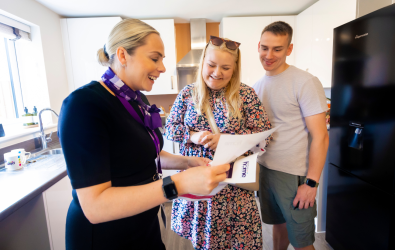Buying a property off-plan has grown in popularity significantly over the last 20 years. Whether you’re a homebuyer or an investor, buying a property prior to completion potentially offers significant benefits.
A major catalyst towards this rising popularity is the advent of affordable home ownership schemes, many of which take advantage of off-plan property opportunities.
Below we explore the ten most important things to consider when buying off-plan and why being prepared is critical during the purchase process.
1. Lay out your budget and wishlist
First things first - you don’t want to go into your property search blind. The best way to start is to establish your budget, what you’re looking for in a property, the amenities you need in the local area and how you plan to purchase. Having all of these questions answered will make your property search significantly easier and most importantly, quicker.
How you’re planning to purchase is the most important question and is largely dictated by your budget. Do you have some savings but not enough for a full deposit? You may want to consider Shared Ownership. Still building your savings pot? Maybe Rent to Buy is better for you.
2. Research the dream location
Once you have a purchase plan, it’s time to find the right location. Always refer back to your wishlist and cross-reference it with properties you find. What you need - plus the way you’re purchasing - will vastly change the areas you might look at.
If you’re buying through Shared Ownership, for example, you may need a local area connection to be eligible. You can find out more about local area connections here.
Similarly, if you’re looking for close proximity to schools or work, make sure that the properties you’re looking at have transport links you can make use of.
3. Research the dream property
Much like the previous step, finding your dream home is simply a case of reviewing your wishlist and matching those points with your discovery.
In most cases, you’ll be reviewing topline features such as number of bedrooms, number of bathrooms, garden size (and layout), parking access and other main features.
Your search may also want to consider potential for an office space and potential for structural changes (if you’re buying outright).
4. Take the time to review the market
Even as a homebuyer, it’s worth thinking of your property purchase as an investment for the future, which is where analysing market conditions is vital.
While you can’t necessarily review the historical value of a new build home like you can with an old build, you can still review the performance of the surrounding housing market.
Take the time to think about how property prices have changed, what demand for housing is like in the area and upcoming developments nearby that might impact how desirable your home is in the future.
5. Consider your perfect specifications
One of the key benefits of off-plan property is the flexibility it offers. Since you’re buying before completion, most developers offer buyers some say in how the property is constructed.
You may get the opportunity to choose fixtures such as flooring and tiling as well as various fittings throughout the home.
It’s worth thinking about how you want the interiors to look and relaying this information, as it ensures that you receive the ideal home for you.
6. Work with a reputable third-party
Even though you might have found the dream home in the dream location, still perform your research around the developer or housing association.
This process is known as ‘due diligence’ and it’s up to you to make sure you’re happy working with the third parties you choose.
Examples of research may include: reading reviews, reading through social media channels, scanning through the developers website for past performance.
Aside from giving you more insight into how the developer works, it may also put you more at ease about going through the off-plan purchase process.
7. Find the right partners
Buying off-plan property isn’t just about working with a developer, it also includes working with financial and legal professionals.
You should always speak to a finance professional before you start the process and liaise with the relevant people at each stage. Mortgage advisors are particularly important people to speak to as they can often provide both practical support on top of strategy assistance.
Similarly, research solicitors to ensure you’re working with someone that has property experience, particularly in the off-plan space. Most developers, housing associations and investment companies have a recommended panel of legal and financial professionals they can put you in touch with.
8. Review your financing plan
At each step of the purchase process, review your finance plan to make sure it’s right for you.
It’s critical to have a grasp of the various off-plan property costs that come with a purchase, as these can significantly impact your bottom line if you’re not prepared for them.
As previously mentioned, always speak to a financial professional if you have questions or concerns - they’re there to help you.
9. Don’t panic!
When you’re waiting for the property to complete, it’s not uncommon for people to panic. This is a natural reaction to such an important life milestone.
The most important thing is to stay calm as panicking during this important period may lead to rash decisions or further stress.
Provided you’re working with reputable third-parties, you’ll be regularly updated on the progress of the property and as always, if you have questions there’s always someone to ask.
10. Establish key dates
It’s vital that you establish two dates before completion.
The first is the ‘build completion’ date. This is when the developer expects the property to be completed and is typically the earliest you’ll be able to move in.
When you’re planning your move - including things such as furniture deliveries - it’s critical to have this in mind.
The second is the ‘long-stop date’. This is the day that the developer expects the property to be completed at the very latest.
Remember that on completion, you’ll have to pay any associated balance remaining on the property.
Buying off-plan offers flexibility and accessibility to homebuyers, with a number of potential benefits. If you’re buying a new-build, chances are you’ll be buying through this method, which is why it’s so important to always refer back to this off-plan property checklist.


